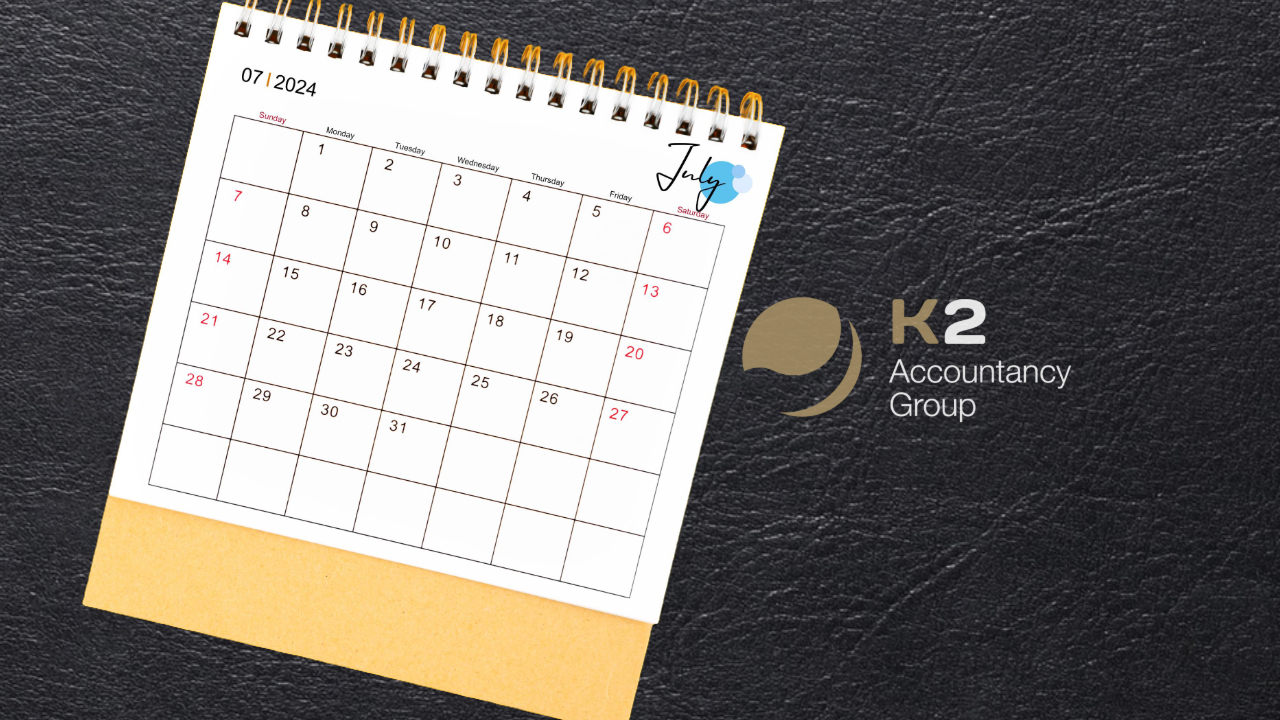
K2 Accountancy Group July Tax Deadline Update
Attention all clients: The second payment on account towards your Income Tax Self Assessment (ITSA) liabilities and Class 4 National Insurance Contributions (NIC) for the tax year 2023/24 is due by 31 July 2024. Here’s what you need to know to ensure compliance and avoid costly penalties.
Key Dates
- First Payment: Due on 31 January 2024.
- Second Payment: Due by 31 July 2024.
- Final Payment: Due by 31 January 2025, covering any remaining ITSA and Class 4 NIC liabilities for 2023/24.
Calculation of Payments on Account
Payments on account are based on your previous year’s tax liabilities (2022/23). Each payment on account is 50% of the total ITSA and Class 4 NIC liability for that year. These payments ensure that your tax contributions are spread out over the year, making it easier to manage your cash flow.
Who Needs to Make Payments on Account?
You are required to make a payment on account for 2023/24 unless:
- Your total ITSA and Class 4 NIC liability for 2022/23 was less than £1,000; or
- More than 80% of your income tax and NIC for 2022/23 was deducted at source (e.g., through PAYE).
Impact of Missing the July Tax Deadline
The ICAEW warns that missing the 31 July 2024 deadline could result in significant interest charges, with HMRC’s current late payment interest rate at 7.75%. It’s crucial to ensure timely payments to avoid these additional costs.
Reducing Payments on Account
If your income or business profits have decreased since the previous tax year, you might be paying too much tax. You can reduce your second payment on account if your ITSA and Class 4 NIC liability for 2023/24 is expected to be lower than that for 2022/23.
To reduce the payment:
- Submit your ITSA return for 2023/24 before 31 July 2024, or
- Apply to HMRC to reduce your payment on account if you cannot submit your return by this date.
Applications can be made online, or by completing and posting the form to HMRC. Your agent can also make this claim on your behalf.
Important Considerations
Ensure that any claim to reduce your payment on account is accurate. Incorrect claims, whether fraudulent or negligent, may result in penalties from HMRC. The maximum penalty is the difference between the payment that should have been made and the amount that was paid.
Basis Period Reform
Sole traders and partners should consider the implications of basis period reform when completing their tax return or estimating their tax liability for 2023/24. If your accounts are prepared to a date other than 31 March or 5 April, your tax liability may be higher than expected.
Final Note
We at K2 Accountancy Group are here to assist you with any queries or concerns regarding your tax payments. Please ensure you are prepared for the 31 July tax deadline to avoid unnecessary penalties. Contact us for further guidance or assistance with managing your payments on account.
Stay informed and proactive to manage your tax obligations efficiently. If you are unable to make payment before the July tax deadline or for more information, contact us directly.
Latest Articles
Autumn 2025 BudgetUpcoming Changes to UK Audit Regulations: What You Now Need to KnowEU Implements New Digital Measures for VAT Compliance. Growing Pains Ahead?International Trade Week Presents New Opportunities and Training for BusinessesBudget 2024 Summary: Key Tax Changes and Challenges for Businesses and Individuals
